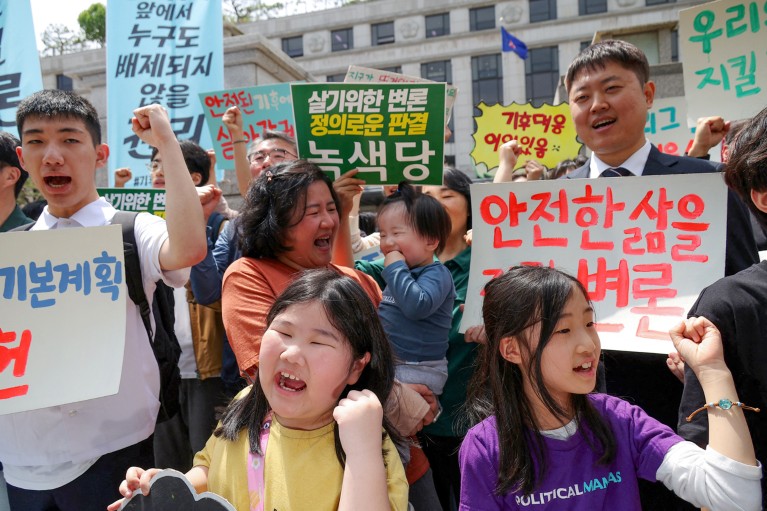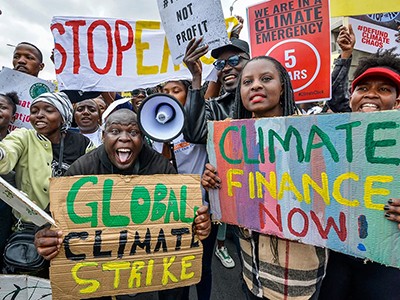
Adults, children and babies — including Woodpecker who is being carried — are among the plaintiffs claiming that the South Korean government is threatening their rights through inaction on climate change.Credit: Kim Hong-Ji/Reuters
The first lawsuit to challenge national climate policies in East Asia could lead to more cases of its kind in the region, say researchers. On 21 May, the South Korean constitutional court will hold its second and final hearing of the case. In the landmark challenge, babies, children, adults and even an unborn child filed petitions to sue the South Korean government for not doing enough to tackle climate change. The plaintiffs claim that the government’s climate goals are too weak, threatening their right to live in a healthy environment.
Such a case is unheard of in East Asia, but similar cases have been filed in places including the United States, Europe, Canada, Australia, India and Brazil. Sejong Youn, who is a legal counsel for the case in Seoul says, “If we have a favourable precedent in South Korea, I think that will really be a trigger in spreading this trend.”
“It will send a message: all countries need to take action in order to tackle this global crisis, and there are no exceptions,” he says.
The case before the court is the result of merging four similar cases that were filed between 2020 and 2023. The first hearing occurred last month.
One of the four cases was filed by parents on behalf of their children, including one unborn child, nicknamed Woodpecker, who is now one year old. “Usually, we first obtain human rights when we are born,” says climate-litigation researcher Masako Ichihara at the Kyoto Climate Adaptation Center in Japan. In this case, Woodpecker acts as a powerful symbol for how society should protect unborn future generations from the impacts of climate change, she says.
Youn hopes a decision on the case will be made later this year, before the country is set to revise the climate plans it takes to the United Nations, known as its nationally determined contribution (NDC). Currently, the South Korean government aims to reduce greenhouse-gas emissions to 40% below 2018 levels by 2030. If all countries held this level of ambition, it would cause up to 3 °C of warming by the end of the century, compared to pre-industrial levels, according to the Climate Action Tracker, which monitors global climate commitments. This overshoots the goal of the 2015 Paris climate agreement to limit warming to well below 2 ºC .
The timing of the ruling matters because the NDC revisions scheduled for next year will lay out South Korea’s climate plans until 2035. “If we have a constitutional ruling on the insufficiency of the current NDC [this year], we will be able to enhance the government’s climate ambitions while they’re working on the 2035 target,” Youn says.
Ripple effect
A ruling in favour of the South Korean plaintiffs would inspire climate activists across Asia and beyond, says Ichihara. “It’s a very big and significant case in Asia.”
People in East Asian countries are generally less likely than those in Western countries to use litigation as a tool to challenge the government’s policies, says Ichihara. “Litigation is a last resort,” she says.
Do climate lawsuits lead to action? Researchers assess their impact
But there is a growing awareness of climate change and litigation as a tool in the region, says Mingzhe Zhu, who studies the links between politics, science and nature at the University of Glasgow, UK. “In China, especially in mainland China in the last decades, climate awareness is definitely growing,” says Zhu.
From a legal standpoint, if the plaintiffs lose their case, it will become less likely that the constitutional court will agree to hear climate cases again, says Zhu. But this should not be seen as a failure, he says. “Even if you lose this time, you can lose beautifully in the sense that you provoked social awareness,” says Zhu. “The very fact that this case went to the constitutional court — that is already a certain sense of success,” he says.
“I believe in people’s creativity. Even if you fail this time, you can learn from this experience and just try another pass,” he adds.


